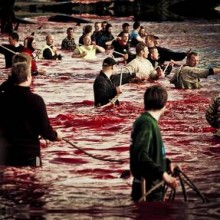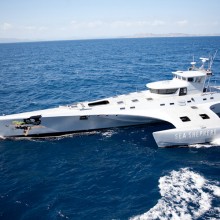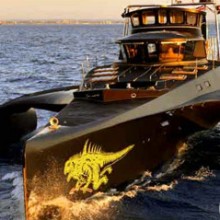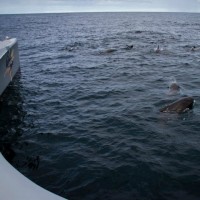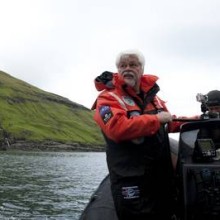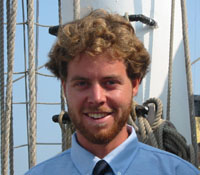EXCLUSIVE Interview with Fraser Hall of WHALE WARS: VIKING SHORES
Mike Vicic - April 27, 2012
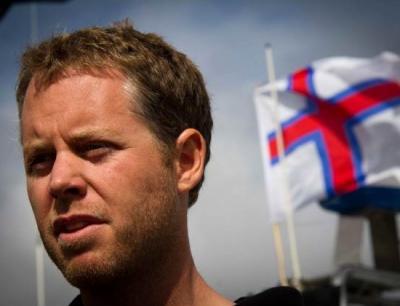
Fraser Hall, the captain of the Brigitte Bardot on WHALE WARS: VIKING SHORES, spoke with TV Tango about working with the Sea Shepherd Conservation Society to stop whaling in the Faroe Islands. Fraser shared his experiences from "Operation Ferocious Islands," revealed what it's like to be in police custody in foreign lands, and relived his scariest incidents at sea.
Tonight, Friday, April 27, 2012 at 9pm ET/PT, Animal Planet presents the world premiere of its new series WHALE WARS: VIKING SHORES.
|
|
|
|
|
Near shore during "The Grind." |
TV Tango: Paul Watson has been protesting "The Grind" since 1986. How did you first get involved in "Operation Ferocious Islands," which is featured in WHALE WARS: VIKING SHORES? Fraser Hall: I'm long-time crew of Sea Shepherd. I was first involved in Sea Shepherd in 2000, and I did two straight years. I captained the old flagship. I keep in touch and I go on campaigns regularly. I've always been interested in the Faroes campaign, but I'd never done one myself until this past Summer [in 2011].
So I got a call from Paul [Watson], saying "I need a captain for the high-speed interceptor boat." The rest is history. I hopped on a plane, and flew to Lerwick [in Scotland] and took command of the interceptor, which turned out to be the first boat to go into confrontation, which I didn't realize would be the case. |
|
|
|
MV Brigitte Bardot |
TV Tango: What was it like captaining the interceptor instead of the flagship? Fraser Hall: The flagship, first of all, has a lot of amenities. It has a large crew. It's a slow vessel with small boats that can go off and do a lot of the dirty work.
With the interceptor boat, it's high speed. It's certainly a good-looking boat, but you do everything from the boat itself, although we have a jet ski for certain things. Another thing about the interceptor boat, the Brigitte Bardot, is that it's a fragile boat. We have to be quite careful with it. It's carbon fiber; so it can withstand damage quite easily, compared to the big steel-hulled ships. |
|
TV Tango: Speaking of which, what kind of damage did the Brigitte Bardot sustain recently [after "Operation Ferocious Islands"]? Fraser Hall: In December [2011], one of the floats, or pontoons, cracked clean off the vessel. It had to limp in. |
|
|
|
|
Gojira, before being transformed into the Brigitte Bardot. |
TV Tango: Just before "Operation Ferocious Islands," the interceptor boat was renamed from Gojira to the Brigitte Bardot and she got a new paint job. What were the reasons behind the transformation? Fraser Hall: The name Gojira [which is Japanese for Godzilla] was in direct reflection to the Japanese whale hunt in Antarctica, because of Godzilla. We thought it would strike some level of fear in the minds of the Japanese. Brigitte Bardot was a long-time supporter of Sea Shepherd, and we thought if we renamed the vessel it would be nice to honor her.
In terms of the paint job, Sea Shepherd has traditionally done a lot of black, but we were going for a little more of a military feel because we are an enforcement agency. We have laws, although it's questionable to the Faroese, on our side, and we do the enforcement. So we wanted to bring that to our campaign. |
|
|
|
Brigitte Bardot protecting whales. |
TV Tango: You mentioned that you thought you had the law on your side. Why has Denmark given the Faroes an exemption from European law, allowing them to kill pilot whales? Fraser Hall: I think there's a number of reasons.
The loudest voices in the Faroes are pushing this as a piece of their culture; so they really want it.
Denmark is the governing body, and they're not allowed to whale, as they're part of the EU, but they seem to give the Faroes a long leash. One primary reason I think this is that it's essentially a two-party system in Denmark. One of the parties wins by a narrow margin. There are two seats in the Faroe Islands, and they tend to be the swing seats; so the Faroes pull a lot more weight than they probably should in politics. They get a lot more grants and services than probably the average Danish person. They stand staunchly behind "The Grind" -- at least the politicians do. |
|
|
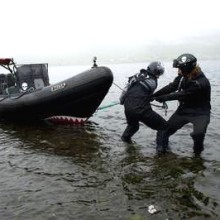 |
TV Tango: How was this campaign different than previous ones? Fraser Hall: It's certainly a different campaign. We waged this campaign on earth, air and sea. We had components of all of those to make sure we could intercept regardless of what stage of "The Grind" was in -- as they herd them in, as they actually do the killing, and the divvying up. It was a very different confrontation than previous WHALE WARS campaigns in Antarctica. |
|
|
Paul Watson. |
TV Tango: When you first entered the Torshavn Harbour, what did you expect to happen since this was your first campaign there? Fraser Hall: I wasn't sure exactly what to expect. Originally, I had assumed I was going to be on the support vessel, the interceptor, and Paul would be by my side [in the flagship]. It was all quite new. I thought "OK, now I've got to run this campaign on my own until Paul gets here." I was nervous.
Paul left the Faroe Islands on May 6 [in 2011] under not-the-greatest circumstances. They were waiting for us, and they were unhappy. But we had to stand our ground and tell them why we were there. The officials hurried me off so they could have a discussion with me off site, away from the vessel. |
|
TV Tango: When did you first find out that Paul wasn't going to join you at the start of the campaign? Fraser Hall: We had come to Lerwick, and we would both cast off. I quickly met with him and he said, "We're not going with you. We've just been arrested." I wasn't there for the actual arrest of the vessel. I assumed he'd say "I'm going to step on board," but he decided to stay with the flagship -- a lot more crew to manage there. I set off for the Faroes with Peter [Hammarstedt] as first mate and the rest of the crew. |
|
|
|
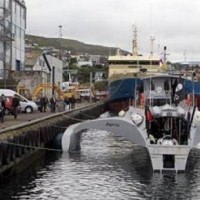 |
TV Tango: What was it like in the harbor when the locals setup a stand to serve pilot whale meat? Fraser Hall: It was interesting. They were trying to provoke a response. But even for a conservationist like myself, it's hard to distinguish a small puck of what they consider food from the whale itself. Once we learned more and saw the graphic images of the whales, we thought, "Wow! That's what they're eating in front of us." It was a remarkably polite way to stand their ground, I think. It's not great to see people eating whales right in front of you, but it could have been a lot more violent. So we were civil with them.
In every port every night we stopped, we met with locals and gave them tours of the vessel. At night we spoke with everyone. During the day we patrolled to make sure that no whales would enter any of the harbors or be killed -- to be ready, on guard, to intercept. |
|
|
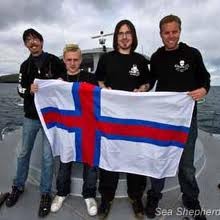 |
TV Tango: When you returned the two local crew members at the end of the campaign, how were they greeted? Fraser Hall: Poorly. Very poorly.
There is opposition to "The Grind," and they tend to be younger, but they are silenced very quickly. These two thought they had the right to stand against "The Grind," and they sailed with us. They'd been getting very threatening text messages while they were at sea, and we essentially had to escort them to a car so they wouldn't get hurt. They were driven off.
I believe one of them said his brother was risking losing a job. Another one wanted to be a pro cyclist and they were going to stop sponsoring him. There were repercussions, even for that short a stay on our boat.
It's unfortunate. I feel bad for the gents. I thought that perhaps more people would stand behind them and we could start a movement from within to stop this hunt. |
|
|
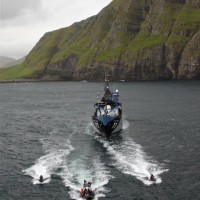 |
TV Tango: Is this campaign going to be an annual event? Fraser Hall: Well, I'm not sure. Unfortunately, it's a resource battle for us. We try to allocate resources as best we can. We obviously made the Antarctic campaign a priority, and it depends on resources. We certainly would love to be back, and if we can do so, we will be. |
|
TV Tango: What do you think it will take to stop "The Grind"? Fraser Hall: I think it will take pressure. It will take these people, unfortunately to some degree, to feel ashamed of this activity. The best way to stop it is to have them stop it themselves. Maybe it starts with controls, and then eventually is eradicated. In my opinion, I rather it just be eradicated right from the get-go. I think it will be the youth. As they come into positions of power and they hopefully rally together, then we can put an end to this. |
|
|
|
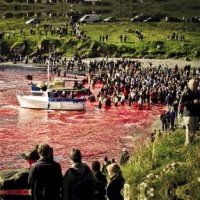 |
TV Tango: Did you find that most of the people who were against "The Grind" were younger than 25-years-old? Fraser Hall: I'd say probably the majority, but there were a few fairly influential people in the community who would take us off to the side and tell us about their objection -- but they could not even be seen speaking to us. Of course, they wouldn't allow us to capture any of this on video or audio.
I hope some things like social media help. These are very connected people who are very well-off. They have a very high net income. They're very connected. They all knew us. They all watched the previous WHALE WARS shows and actually, for the most part, agreed with our policies and our action there [in Antarctica]. But in this case, on your own home turf, it's a little tougher to swallow. |
|
|
|
TV Tango: Earlier you said you started with Sea Shepherd back in 2000. How'd you get that first job? Fraser Hall: I was a young computer engineer programming firmware for laser imaging systems -- the nerdy stuff -- and I heard about Paul when a friend had passed on a weblink. I couldn't believe that this person was actually standing up. Not hanging the banner, not lobbying -- although I do believe in those activities -- but this was far more suited to me. I'd been a sailor previously, and I thought "Wow!" I immediately quit my job, and begged to get on a crew. Eventually, Paul caved and said "Yes. If you show up on the boat in Amsterdam, I'll let you clean the deck and be a deckhand."
Very quickly I rose through the ranks. |
|
TV Tango: I assume you're never going back to be a computer engineer? Fraser Hall: No. Whenever I can, I get back to the Sea Shepherd. I do have a technology company, Recon Instruments, that builds heads-up displays that go into ski goggles. That's my day job. We're facing off toe-to-toe with Google on their Google Glass project. |
|
|
|
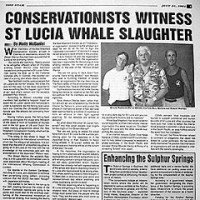 |
TV Tango: What happened when you were in police custody in the Caribbean? Fraser Hall: That's a long way back. I believe this was the whaling and turtling campaign in the Caribbean.
I was hauled into police custody for essentially filming a whaling hunt just outside of St. Vincent. They hauled me in and interrogated and tried to erase all our video. They held us for the better part of a day, and they were actually quite threatening with us. Eventually they figured, "We can't hold them for anything," and off we went. It was a scary situation. |
|
TV Tango: How many times have you been detained? Fraser Hall: Personally, only twice, I believe. The vessel's been detained quite a few times, with me on board, like trying to flee Costa Rica.
TV Tango: What's your scariest incident fleeing on a vessel? |
|
|
|
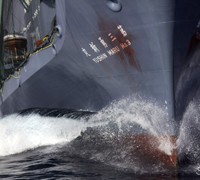 |
TV Tango: I understand the interceptor was in a near-miss or two. Have you ever been in a boat that's been rammed? Fraser Hall: I have been in a collision off the coast of Guatemala. It wasn't really determined who was at fault, as far as I know. That was with a shark-finning vessel. It's quite an experience.
You think you know your vessel well, and you think about the thickness of the steel and the thickness of their boat. Of course, you're not trying to sink anybody, you're mostly trying to avoid a collission all together -- the odd time you'll give her a tap. When it gets to those last moments -- these are hundreds and thousands of tons of steel running into each other on the sea. There's an uncertainty to it, although you try to make it as calculated as possible or you're avoiding that situation. So your heart's in your throat just prior to impact, that's for sure. You don't know how hard you're going to feel. You don't know what's going to take place; so there's certainly a feeling of uncertainty. |
|
|
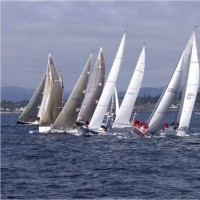 |
TV Tango: Earlier you said that you were a sailor. Have you ever sailed in an event like America's Cup? Fraser Hall: I am a racer. I race quite a bit, actually. I'm racing from Vancouver to Hawaii over the month of July in a race called the Vic-Maui. No America's Cup -- not too professional yet. |
|
|
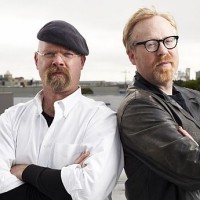 |
TV Tango: When you get the chance to watch TV, what TV series do you watch? Fraser Hall: When I do get the chance, obviously WHALE WARS is a big one for me. FLYING WILD ALASKA, because I'm a pilot as well. That's a great one.
I'm at sea quite a bit or at the desk; so I don't get to watch as many of these shows as I'd like to.
TV Tango: If you had a day off, what would you want to watch? Fraser Hall: Frankly, I'm a bit of a nerd, and it would be technology news and review shows. Maybe even go as far as MYTHBUSTERS if I was really into getting entertained. |
|
|
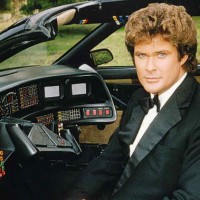 |
TV Tango: If you could be any fictional character in TV history, who would you chose to be? Fraser Hall: Probably some vigilante, like Michael Knight from KNIGHT RIDER. I'd be him. |
|
|
Fraser Hall was recently on CNN, and you can watch the embedded video below:

